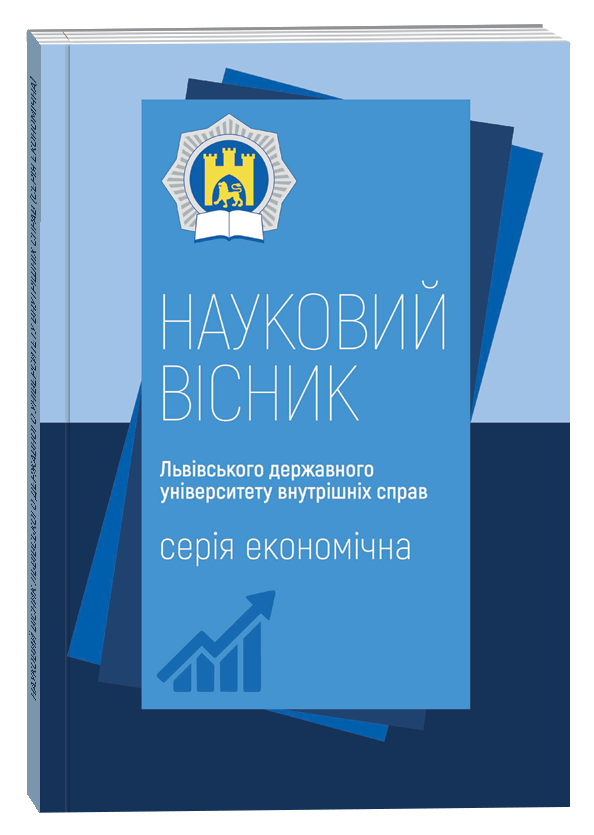THE CONCEPT OF «BUDGET SECURITY» AND ITS MAIN CHARACTERISTICS
DOI:
https://doi.org/10.32782/2311-844X/2022-1-6Keywords:
budgetary security, economic security of the state, public debt, fiscal policyAbstract
The article reveals the essence of the concept of "budgetary security" and its main characteristics. The role of fiscal policy in achieving budgetary security of the state is substantiated. Fiscal stimulus is said to have a lasting impact on output by increasing aggregate supply – likely by bringing more people into the workforce, creating capital, or promoting more innovation and thus faster productivity growth. Budgetary security in the system of economic security of the state is presented. It is noted that the state budget of Ukraine is an important tool for regulating financial flows, the imbalance of which is a real threat to the financial security of the state, for which macroeconomic indicators are of great importance, since threshold values are the most important tool for systemic analysis, forecasting and socio-economic planning. Indicators or quantitative parameters should have the status of approved by the state, compliance with which should become an integral part of state economic programs. In modern conditions of structural changes and the significant impact of globalization processes, the change in financial indicators significantly affects the dynamics of the country's economic development as a whole. Under such circumstances, timely analysis and forecasting of indicators of financial and budgetary security of Ukraine becomes especially relevant. In the conditions of global and transformational changes, one of the most important economic problems in Ukraine after gaining independence is the growing threat to Ukraine's financial and, in particular, budgetary security. First, it is related to negative events in the socio-economic sphere, in particular, the violation of the financial system of state finances and economic units, which has increased in recent years and is reflected in the chronic deficit of the state budget. The integral indicator of the budget security of the state is very important and occupies a significant place among the indicators that determine its financial and economic security of the state. This necessitates the search for new methodological approaches to determine the actual level of the state's budgetary security. The influence of global financial systems on one state reaches a new level. Fiscal security is not only a national problem, but also a defining determinant of the global economy today, which is formed by the deepening and interaction of transnationalism and international regional economic integration. Given the complexity of the interrelationship and interdependence of fiscal security with sustainable economic development, it has both internal and external aspects. The authors concluded that budget security reflects the state's ability to appropriately respond to internal and external negative financial consequences. The protection of national interests in the financial and economic spheres depends to a certain extent on the implementation of long-term financial policy, which is based on the reform of the public finance management system, ensuring macroeconomic stability, restoring economic dynamics.
References
Boston Consulting Group (2009). Global wealth report, “Deliviring on the client promise”. URL: https://docplayer.net/amp/42377324-Report-global-wealth-2009-delivering-on-the-client-promise.html
Бюджетна безпека України в координатах гібридних загроз фінансовій системі. URL: https://niss.gov.ua/sites/default/files/2017-05/byudzh_dezpeka-76082.pdf
Бородій О. А. Управління бюджетною безпекою України : автореф. дис. канд. екон. наук. Чернігів, 2015. 23 с. URL: http://www.stu.cn.ua/media/files/pdf/dis/aref_borodiy.pdf
Флейчук М. І., Наконечна Н. В., Щурко У. В., Гончарук А. Я. Фінансовий контролінг в системі зміцнення економічної безпеки держави : монографія. Львів : Ліга-Прес, 2012. 260 с.
Богма О. С. Сутність бюджетної безпеки в системі забезпечення національних інтересів. Економіка і суспільство. 2016. № 4. С. 282–285.
Ковпак О. В. Інституціональні інструменти зміцнення бюджетної безпеки України : автореф. дис. канд. екон. наук. Львів : ЛьвДУВС. 22 с. URL: http://dspace.lvduvs.edu.ua/handle/1234567890/234
Ковпак О. В. Інструменти протидії загрозам розвитку бюджетної сфери. Економічний аналіз. 2017. Том 27. Вип. 3. С. 31–36.
Марченко О. М., Пушак Я. Я., Ревак І. О. Фінансова безпека держави : навч. посібник. Львів, 2020. 356 с
Boston Consulting Group (2009). Global wealth report, “Deliviring on the client promise”. Available at: https://docplayer.net/amp/42377324-Report-global-wealth-2009-delivering-on-the-client-promise.html
Budghetna bezpeka Ukraine v koordunatah gibrudnuh zagroz financoviy cuctemi. Available at: https://niss.gov.ua/sites/default/files/2017-05/byudzh_dezpeka-76082.pdf
Borodiy O. (2015) Ypravlinny budghetnoy bezpekoy Ukraine. Chernigiv, p. 23. Available at: http://www.stu.cn.ua/media/files/pdf/dis/aref_borodiy.pdf
Flejchuk M., Nakonechna N., Shhurko U., Goncharuk A. (2012) Finansovyj kontroling v systemi zmicznennya ekonomichnoyi bezpeky derzhavy [Financial Controlling in the System of Strengthening the Economic Security of the State]. Lviv: Liga-Pres, p. 260.
Bogma O. (2016) Sytnist budghetnoy bezpeku v sysemi zabezpechenny nacionalnux intereciv. Economika and syspilstvo, vol. 4, pp. 282–285.
Kovpak O. (2018) Inctutycionalni instrymentu Інституціональні інструменти zmicnenny budghetnoy bezpekoy Ukraine. Lviv, p. 22. Available at: http://dspace.lvduvs.edu.ua/handle/1234567890/234
Kovpak O. (2017) Instrymentu protudii zagrozam rozvutky bydghetnoi sferu. Economic analysis, vol. 3, pp. 31–36.
Marchenko O., Pushak Y., Revak I. (2020) Financova bezpeka dergavu. Lviv, p. 356. Available at: http://dspace.lvduvs.edu.ua/bitstream/1234567890/2964/1/FinansovaBezpeka_30-04_2020.pdf





